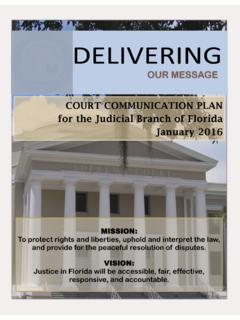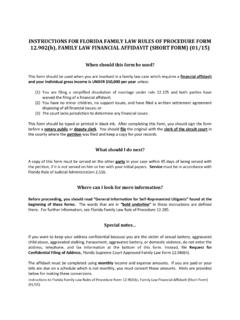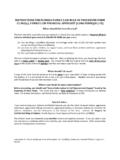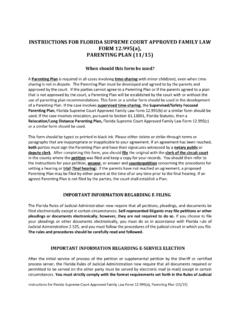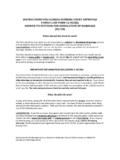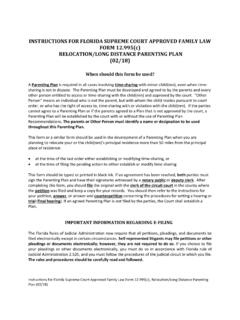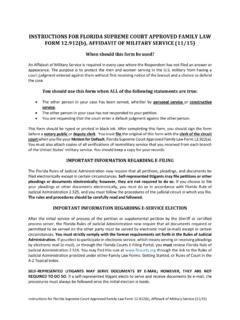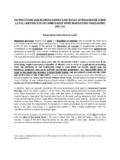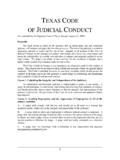Transcription of RULE 2.420. PUBLIC ACCESS TO JUDICIAL BRANCH …
1 RULE PUBLIC ACCESS TO JUDICIAL BRANCH RECORDS (a) Scope and Purpose. Subject to the rulemaking power of the Florida Supreme Court provided by article V, section 2, Florida Constitution, the following rule shall govern PUBLIC ACCESS to the records of the JUDICIAL BRANCH of government. The PUBLIC shall have ACCESS to all records of the JUDICIAL BRANCH of government, except as provided below. (b) Definitions. (1) Records of the JUDICIAL BRANCH are all records, regardless of physical form, characteristics, or means of transmission, made or received in connection with the transaction of official business by any JUDICIAL BRANCH entity and consist of.
2 (A) court records, which are the contents of the court file, including the progress docket and other similar records generated to document activity in a case, transcripts filed with the clerk, documentary exhibits in the custody of the clerk, and electronic records, videotapes, or stenographic tapes of depositions or other proceedings filed with the clerk, and electronic records, videotapes, or stenographic tapes of court proceedings; and (B) administrative records, which are all other records made or received pursuant to court rule, law, or ordinance, or in connection with the transaction of official business by any JUDICIAL BRANCH entity.
3 (2) JUDICIAL BRANCH means the JUDICIAL BRANCH of government, which includes the state courts system, the clerk of court when acting as an arm of the court, The Florida Bar, the Florida Board of Bar Examiners, the JUDICIAL Qualifications Commission, and all other entities established by or operating under the authority of the supreme court or the chief justice. (3) Custodian. The custodian of all administrative records of any court is the chief justice or chief judge of that court, except that each judge is the custodian of all records that are solely within the possession and control of that judge.
4 As to all other records, the custodian is the official charged with the responsibility of maintaining the office having the care, keeping, and supervision of such records. All references to custodian mean the custodian or the custodian s designee. (4) Confidential, as applied to information contained within a record of the JUDICIAL BRANCH , means that such information is exempt from the PUBLIC right of ACCESS under article I, section 24(a) of the Florida Constitution and may be released only to the persons or organizations designated by law, statute, or court order.
5 As applied to information contained within a court record , the term exempt means that such information is confidential. Confidential information includes information that is confidential under this rule or under a court order entered pursuant to this rule. To the extent reasonably practicable, restriction of ACCESS to confidential information shall be implemented in a manner that does not restrict ACCESS to any portion of the record that is not confidential. (5) Affected non-party means any non-party identified by name in a court record that contains confidential information pertaining to that non-party.
6 (6) Filer means any person who files a document in court records, except filer does not include the clerk of court or designee of the clerk, a judge, magistrate, hearing officer, or designee of a judge, magistrate or hearing officer. (c) Confidential and Exempt Records. The following records of the JUDICIAL BRANCH shall be confidential: (1) Trial and appellate court memoranda, drafts of opinions and orders, court conference records, notes, and other written materials of a similar nature prepared by judges or court staff acting on behalf of or at the direction of the court as part of the court s JUDICIAL decision-making process utilized in disposing of cases and controversies before Florida courts unless filed as a part of the court record .
7 (2) Memoranda or advisory opinions that relate to the administration of the court and that require confidentiality to protect a compelling governmental interest, including, but not limited to, maintaining court security, facilitating a criminal investigation, or protecting PUBLIC safety, which cannot be adequately protected by less restrictive measures. The degree, duration, and manner of confidentiality imposed shall be no broader than necessary to protect the compelling governmental interest involved, and a finding shall be made that no less restrictive measures are available to protect this interest.
8 The decision that confidentiality is required with respect to such administrative memorandum or written advisory opinion shall be made by the chief judge; (3) (A) Complaints alleging misconduct against judges until probable cause is established; (B) Complaints alleging misconduct against other entities or individuals licensed or regulated by the courts, until a finding of probable cause or no probable cause is established, unless otherwise provided. Such finding should be made within the time limit set by law or rule. If no time limit is set, the finding should be made within a reasonable period of time; (4) Periodic evaluations implemented solely to assist judges in improving their performance, all information gathered to form the bases for the evaluations, and the results generated therefrom; (5) Only the names and qualifications of persons applying to serve or serving as unpaid volunteers to assist the court, at the court s request and direction, shall be accessible to the PUBLIC .
9 All other information contained in the applications by and evaluations of persons applying to serve or serving as unpaid volunteers shall be confidential unless made PUBLIC by court order based upon a showing of materiality in a pending court proceeding or upon a showing of good cause; (6) Copies of arrest and search warrants and supporting affidavits retained by judges, clerks, or other court personnel until execution of said warrants or until a determination is made by law enforcement authorities that execution cannot be made; (7) All records made confidential under the Florida and United States Constitutions and Florida and federal law; (8) All records presently deemed to be confidential by court rule, including the Rules for Admission to the Bar, by Florida Statutes, by prior case law of the State of Florida, and by the rules of the JUDICIAL Qualifications Commission.
10 (9) Any court record determined to be confidential in case decision or court rule on the grounds that (A) confidentiality is required to (i) prevent a serious and imminent threat to the fair, impartial, and orderly administration of justice; (ii) protect trade secrets; (iii) protect a compelling governmental interest; (iv) obtain evidence to determine legal issues in a case; (v) avoid substantial injury to innocent third parties; (vi) avoid substantial injury to a party by disclosure of matters protected by a common law or privacy right not generally inherent in the specific type of proceeding sought to be closed; (vii) comply with established PUBLIC policy set forth in the Florida or United States Constitution or statutes or Florida rules or case law; (B) the degree, duration, and manner of confidentiality ordered by the court shall be no broader than necessary to protect the interests set forth in subdivision (A).
